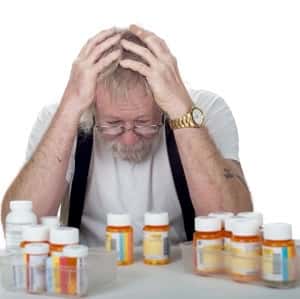
Americans take a lot of medicines. Almost two-thirds of us take at least one prescription medication daily. One fifth take more than five different doctor-prescribed drugs. That does not include any over-the-counter medications or dietary supplements. The trouble is that the more medicines we take, the more likely we are to experience a scary side effect.
Older Adults at Greatest Risk:
A study in JAMA found that older people are especially vulnerable to complications. Over one-third of emergency department visits for adverse drug events were made by people over 65. Anticoagulants and diabetes medicines were especially troublesome in this age group.
No matter how old you are, always ask about what to expect when you get a new prescription. How will you benefit? How long should you take it? And is there a scary side effect that should prompt a call to the doctor or a trip to the nearest emergency department? To help you gather this information, we offer our free Drug Safety Questionnaire.
Can You Minimize the Risk of a Scary Side Effect?
Because prescribers and pharmacists may not always take the time to check on drug interactions, patients and their family members should ask whether any of the pills they are taking might be incompatible.
Journal of the American Medical Association, Nov. 22/29, 2016
Brown Bag Review:
We are big fans of the brown bag review. From time to time, make an appointment with your primary care provider or your pharmacist to go over all the drugs you are taking. Put everything into a lunch bag (hence the “brown bag”), including any dietary supplements, vitamins, OTC pills and other things you might not think of as drugs. That way the expert can spot obvious incompatibilities and may be able to help you address some nagging health problems by stopping certain things rather than adding more medications. This is the concept behind deprescribing (Canadian Journal of Hospital Pharmacy, May-June 2013). We don’t suggest that people stop taking prescription medicines on their own, but sometimes discontinuing a drug you no longer need is the best way to treat a scary side effect.

